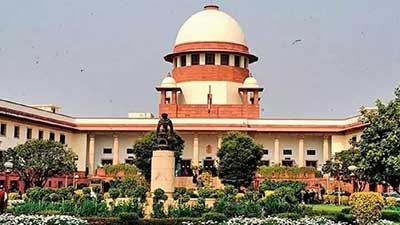Context-
The recent judgment by the Supreme Court of India permitting a six-month extension to Delhi's Chief Secretary, Naresh Kumar, has raised concerns about the court's judicial approach and its implications for democratic governance
Background:
The Supreme Court's decision in November 2023 allowing the extension of Chief Secretary Naresh Kumar's tenure comes amid serious charges of corruption and favoritism against him. The Delhi Chief Minister, Arvind Kejriwal, sought Kumar's removal, and the Delhi government initiated discussions with the Centre on appointing a successor before his scheduled retirement on November 30, 2023.
Passage of the Amendment Act:
The Government of National Capital Territory of Delhi (Amendment) Act 2023, which had been challenged by the Delhi government, played a crucial role in shaping the court's decision. The Act aimed to counter portions of a previous Services judgment that emphasized the elected government of Delhi's control over services in the region. Despite the challenge, the Act remained in force, paving the way for the Union Government to assert authority over civil services in the national capital.
Contradictions in the Supreme Court's Rationale:
● Departure from Previous Services Judgment: The Services judgment, delivered by a five-judge Constitution Bench, unequivocally held that references to "state government" in relevant rules related to Delhi meant the Government of Delhi. This implied that the Delhi government's recommendation was essential for extending the Chief Secretary's tenure under Rule 16 of the All India Services (Death-cum-Retirement Benefits) Rules, 1958. However, the recent Supreme Court decision carved an exception for the Chief Secretary, arguing that he is differently placed than other officers and not bound by the Services judgment.
● Alleged Conflict of Interest: Even if the Delhi government's recommendation did not strictly apply, the extension of the Chief Secretary's tenure required "full justification" and must be in "public interest." Serious allegations of conflict of interest against Kumar, coupled with the Chief Minister's recommendation for immediate removal, raise questions about the court's oversight in ensuring these conditions were met.
Constitutional Interpretation and Royappa Case:
● Role of Chief Secretary as per Royappa: The role of the Chief Secretary was initially delineated by the Supreme Court in the Royappa case, emphasizing the position's significance as a post of great confidence and the "lynchpin in the administration." However, in the recent decision, the court appeared to sidestep its own precedent, postponing the application of Royappa to a later date when hearing the challenge to the constitutional validity of the Amendment Act.
● Selective Application of Royappa Observations: While ignoring Royappa's applicability to the Chief Secretary's matter, the court selectively used observations from the case to argue that the Chief Secretary must comply with the elected government's directions. This apparent inconsistency raises questions about the court's commitment to a coherent and principled legal interpretation.
Flaws in the Supreme Court's Reasoning:
● Ignoring the 2023 Amendment: The Supreme Court's order allowing the extension of the Chief Secretary's tenure did not explicitly rely on the 2023 Amendment, which granted the Centre statutory authority over civil services in Delhi. The failure to incorporate this amendment into its reasoning exposes a flaw in the court's decision-making process.
● Misinterpretation of Delhi Government's Position: The Delhi government did not seek complete divestment of the Union Government's power to appoint the Chief Secretary; instead, it advocated for a collaborative process. However, the court erroneously held that the Lt. Governor, while referring to the Union Government, acts in his sole discretion. This misinterpretation undermines the essence of collaborative governance.
Implications for Democratic Functioning:
● Chain of Accountability: The Services judgment highlighted the necessity of the Delhi government's control over services for proper democratic functioning, recognizing a triple chain of accountability. However, the recent decision allowing the unilateral extension of the Chief Secretary's tenure disrupts this chain, leading to a breakdown in trust between the elected government and the bureaucracy.
● Perpetuating Distrust: The rupture in the relationship between the Chief Secretary and the elected government, particularly when serious allegations of corruption are involved, perpetuates distrust and hampers effective governance. The court's failure to address this aspect raises concerns about the long-term implications for democratic institutions.
Conclusion:
In conclusion, the Supreme Court's decision to permit the extension of Delhi Chief Secretary Naresh Kumar's tenure reveals significant contradictions in its judicial approach. The departure from established principles, misinterpretation of constitutional provisions, and failure to consider the implications for democratic functioning raise questions about the court's commitment to upholding the rule of law. As the legal landscape evolves, the judiciary must navigate complex issues while remaining true to its foundational principles to ensure a robust and accountable democratic system.
|
Probable Questions for UPSC Mains Exam- 1. Evaluate the constitutional implications of the Supreme Court's decision allowing the extension of Delhi Chief Secretary Naresh Kumar's tenure, particularly in relation to the Government of National Capital Territory of Delhi (Amendment) Act 2023. Discuss the potential impact on the power dynamics between the elected government and the Union Government, highlighting the departure from the Services judgment. (10 Marks, 150 Words) 2. Critically assess the Supreme Court's rationale in the case of Delhi Chief Secretary's tenure extension, considering issues such as alleged conflict of interest, misinterpretation of the Delhi government's position, and the selective application of the Royappa case. Analyze the broader implications for democratic governance and the accountability chain. (15 Marks, 250 Words) |
Source- The Hindu







